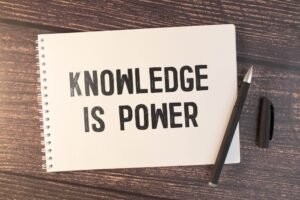We often navigate a complex landscape of challenges and opportunities in a world characterized by rapid change and evolution. Amidst the noise and distractions of modern life, one principle remains unwavering: the pursuit of knowledge is indispensable. The quest for understanding is not merely an academic endeavor; it is a lifetime journey that shapes our character, influences our decisions, and ultimately defines our existence. Embracing this journey and committing to continuous learning can lead to profound personal and professional growth.
The Importance of Knowledge
Knowledge, in its simplest form, is the information, understanding, and skills we acquire through experience or education. However, to regard knowledge simply as a collection of facts would be an oversimplification. Knowledge empowers us by providing context—a framework within which we interpret the world around us and make sense of our experiences. The philosopher Socrates famously noted, “The only true wisdom is in knowing you know nothing.” Acknowledging this fosters humility, allowing for continued growth and opening the door to new ideas, perspectives, and experiences.
1. Knowledge Drives Personal Growth
Each piece of knowledge we acquire adds depth to our understanding of the world. Embracing a growth mindset—the belief that abilities and intelligence can be developed through hard work, effort, and perseverance—enables us to view challenges as opportunities for learning. This mindset fosters resilience, allowing us to bounce back from failures and setbacks.
As we engage with different forms of knowledge—be it through reading, traveling, participating in discussions, or lifelong education—we become more astute thinkers. This growth not only enhances our decision-making capabilities but also promotes empathy, as understanding diverse perspectives can foster connections with others. Personal development through knowledge is a journey that enriches our lives and affirms our values.
2. Knowledge Enhances Professional Opportunities
In today’s dynamic job market, the pursuit of knowledge is paramount. Continuous learning becomes essential in keeping pace with technological advancements and evolving industry standards. Careers that once promised stability can vanish, while entirely new fields emerge, often requiring specialized skills and knowledge.
Employers increasingly seek candidates who demonstrate a commitment to lifelong learning and adaptability. By actively pursuing training, certifications, workshops, and networking opportunities, individuals position themselves as valuable assets in the workforce. Furthermore, knowledge acquisition can facilitate upward mobility—opening avenues for promotion, specialization, and even entrepreneurship.
3. Knowledge Empowers Critical Thinking
Critical thinking is one of the most important skills one can possess in a world overflowing with information. With the rise of digital media, we are inundated with data—some factual, some misleading, and some completely fabricated. A solid foundation of knowledge equips us to sift through this information critically, assessing its validity before integrating it into our understanding.
This ability to critically analyze information goes beyond mere discernment; it cultivates our capacity to question norms, challenge assumptions, and engage with concepts in a meaningful way. Knowledge encourages curiosity—the engine of innovation and progress. In nurturing this curiosity, we cultivate the ability to think for ourselves, develop sound arguments, and arrive at well-informed conclusions.
4. Knowledge creates Social Change
Throughout history, knowledge has been the catalyst for societal change. Movements for civil rights, gender equality, and environmental conservation have been driven by individuals and groups committed to education and the dissemination of knowledge. When people understand the issues at hand—armed with facts and insights—they are better equipped to initiate change and challenge the status quo.
Moreover, a society that values knowledge fosters inclusivity and diversity. The full spectrum of ideas can only be realized when individuals from different backgrounds share their understanding and experiences. This blending of knowledge creates a richer tapestry of human experience, driving progress and igniting innovation.
5. The Lifelong Journey of Learning
The journey of learning is not confined to formal education. While traditional schooling provides foundational knowledge, learning is a lifelong endeavor that can take many forms. Whether through books, online courses, podcasts, workshops, mentorship, or hands-on experiences, knowledge acquisition should be seen as an ongoing process.
Incorporating learning into our daily lives can be as simple as setting aside time for reading, engaging in discussions with diverse individuals, seeking feedback from peers, or even exploring hobbies that challenge our thinking. Technology also provides unprecedented access to information—enabling us to explore subjects that spark our interest at our own pace.
It is essential to cultivate a genuine curiosity and remain open to new experiences. Embrace the discomfort of not knowing; it is often in these moments that the most meaningful learning occurs.
6. Cultivating a Knowledge-Absorbing Environment
To remain committed to the acquisition of knowledge, it is essential to create an environment conducive to learning. Surrounding ourselves with individuals who value education can inspire us to pursue our own learning journeys.
Participating in book clubs, study groups, or workshops can amplify our exposure to new ideas while fostering discussions that deepen our understanding. Limiting exposure to negative influences—whether toxic environments or closed-minded individuals—can help maintain our motivation and enthusiasm for growth.
Educational advancements, like online courses and massive open online courses (MOOCs), allow us to access quality content from world-renowned institutions right from the comfort of our homes. Embracing the resources available to us, while remaining committed to connecting with others, creates a hub for knowledge-sharing and collaborative learning.
Conclusion: Commit to Knowledge
In conclusion, the one thing you cannot give up on in life is obtaining knowledge. The quest for understanding enriches our lives in myriad ways—promoting personal growth, opening professional opportunities, empowering critical thinking, and facilitating social change.
As we commit to lifelong learning, remember that the act of seeking knowledge demands curiosity, perseverance, and, above all, resilience. Push beyond the boundaries of your comfort zone, challenge yourself every day, and embrace the power of knowledge. It is a journey that can lead to profound transformations, guiding not only your own life but the lives of those around you.
In the words of Mahatma Gandhi, “Live as if you were to die tomorrow. Learn as if you were to live forever.” If there’s a constant in life that can lead to a meaningful and fulfilling existence, it is the relentless pursuit of knowledge. Whether through academic endeavors or the everyday lessons life teaches us, embrace the journey—it’s one worth taking.


[…] is often overlooked in our pursuit of personal growth and success. While we eagerly chase after knowledge—reading books, attending seminars, taking courses, and engaging in discussions to expand our […]